Tetramorium africanum (Mayr)
 Type location Ghana (Macromischa
africana, Mayr, 1866a: 507, worker; Mayr, 1895: 131, queen) - see
below Type location Ghana (Macromischa
africana, Mayr, 1866a: 507, worker; Mayr, 1895: 131, queen) - see
below
junior
synonyms
lamottei (Bernard, 1952: 247, illustrated, queen)
from Guinea, Zouépo on Mt. Nimba, by Lamotte - see below
tessmanni (Forel, 1910e: 421, worker; synonymisation
by Brown, 1964c: 12) from Equatorial
Guinea, Alen, by Tessmann - see below
worker and queen described (see Bolton,
1995)  . .
|
Mayr's (1866a) description is at  . Mayr's (1895) description of the queen is
at . Mayr's (1895) description of the queen is
at  . Forel's (1910e) description of tessmanni
is at . Forel's (1910e) description of tessmanni
is at  . Bolton's modern
description (1980: 355) is at . Bolton's modern
description (1980: 355) is at  . .
|
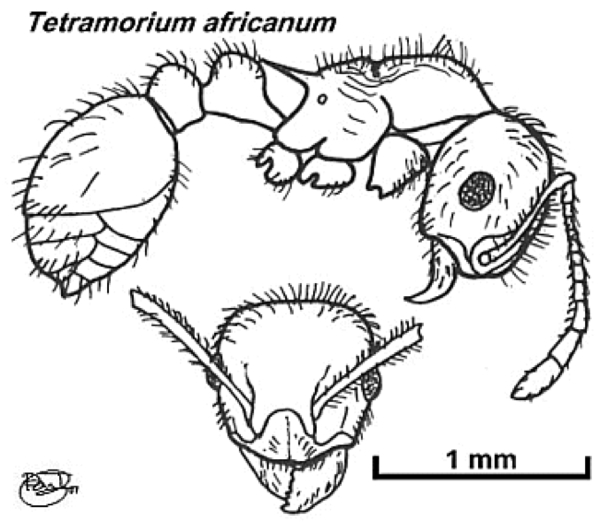 Nigeria
specimens (as Macromischoides species T², Taylor, 1979: 61).
WORKER. - TL 3.67 mm, HL 0.84, HW 0.75, SL 0.86, PW 0.54 Nigeria
specimens (as Macromischoides species T², Taylor, 1979: 61).
WORKER. - TL 3.67 mm, HL 0.84, HW 0.75, SL 0.86, PW 0.54
Redefined by Bolton (1980, illustration of head and alitrunk)
Colour orange, gaster darker. Sculpturation, of faint rugae, limited to
the alitrunk. Erect hairs only moderately abundant. Denticles well
developed on the mandibles. Clypeus with slight emargination,
anteriorly with a central carina, posterior apex depressed relative to
the remainder of the dorsum of the head. Head only slightly narrowed
posterior to the eyes, rounding into a near flat occipital margin;
frontal carinae fairly short, not extending beyond the level of the
eyes. No antennal scrobes, but antennae only slightly longer than
occipital margin. Metanotal groove slightly impressed; propodeal spines
narrow, flat and relatively short; no projecting metapleural lobes.
Petiole with a short relatively thick peduncle; the node a smooth
hemispherical dome in profile.
Collected in Nigeria by my staff from the canopy of forest
trees which were surveyed during felling operations at the Cocoa
Research Institute of Nigeria, Idi Ayunre, listed by Bolton (1980).
|
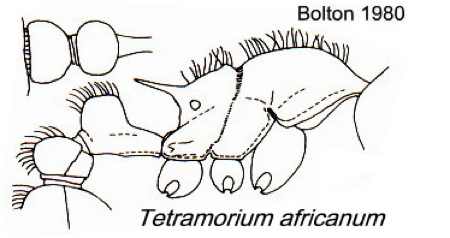 Forel
(1916) noted that it constructed nests similar to those of T.
aculeatum, but much bigger and that the sting was very powerful,
akin to that of Tetraponera aethiops and much feared. Forel
(1916) noted that it constructed nests similar to those of T.
aculeatum, but much bigger and that the sting was very powerful,
akin to that of Tetraponera aethiops and much feared.
Bernard's (1952) record was of a single alate queen,
from Zouépo, grassland at 1050 m; TL 4.3 mm. The head, thorax and
petiole he described as all densely reticulo-striated, postpetiole and
gaster smooth. Entirely red-orange, except sides of gaster yellower and
shiny. His recognition of "lamottei" as a Tetramorium
while he had Macromischoides for aculeatum (see above)
perhaps adds to my reservations regarding the synonymy adopted by
Bolton (1976).
Bolton (1980) described it as widespread in the forests
of West and Central Africa, listing other findings from Liberia (no
location); Ghana, at CRIG (by himself); Cameroun at
Ntsama (by C.A. Collingwood); also Gabon and Zaïre, but the few records
suggest that it is not a common species. Wheeler (1922) earlier listed
it from Guinea (Conakry, F. Silvestri), Nigeria (Old
Calabar, H. Brauns, in Mayr, 1895); Cameroun (Victoria, F.
Silvestri; Mbalmajo to Ekeneli, G. Schwab) and Congo basin localities.
Forel (1911f) reported africanum from Zaïre, Congo da Lemba by
Mayné.
|
 The photomontage of the
type
worker is collated from http://www.antweb.org/specimen.do?name=casent0919644. The photomontage of the
type
worker is collated from http://www.antweb.org/specimen.do?name=casent0919644.
|
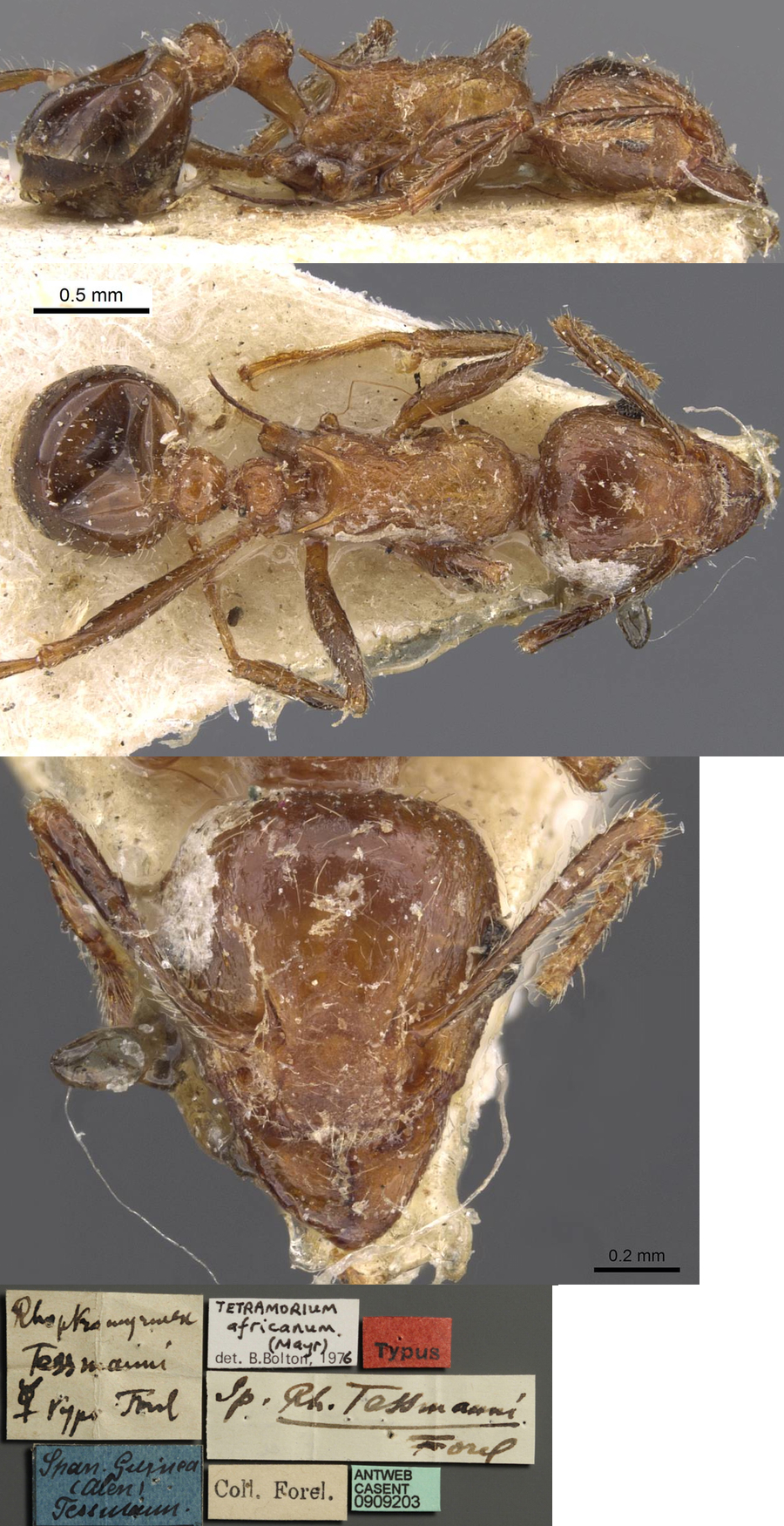 The photomontage of the tessmanni type
worker is collated from http://www.antweb.org/specimen.do?name=casent0909203. The photomontage of the tessmanni type
worker is collated from http://www.antweb.org/specimen.do?name=casent0909203.
|
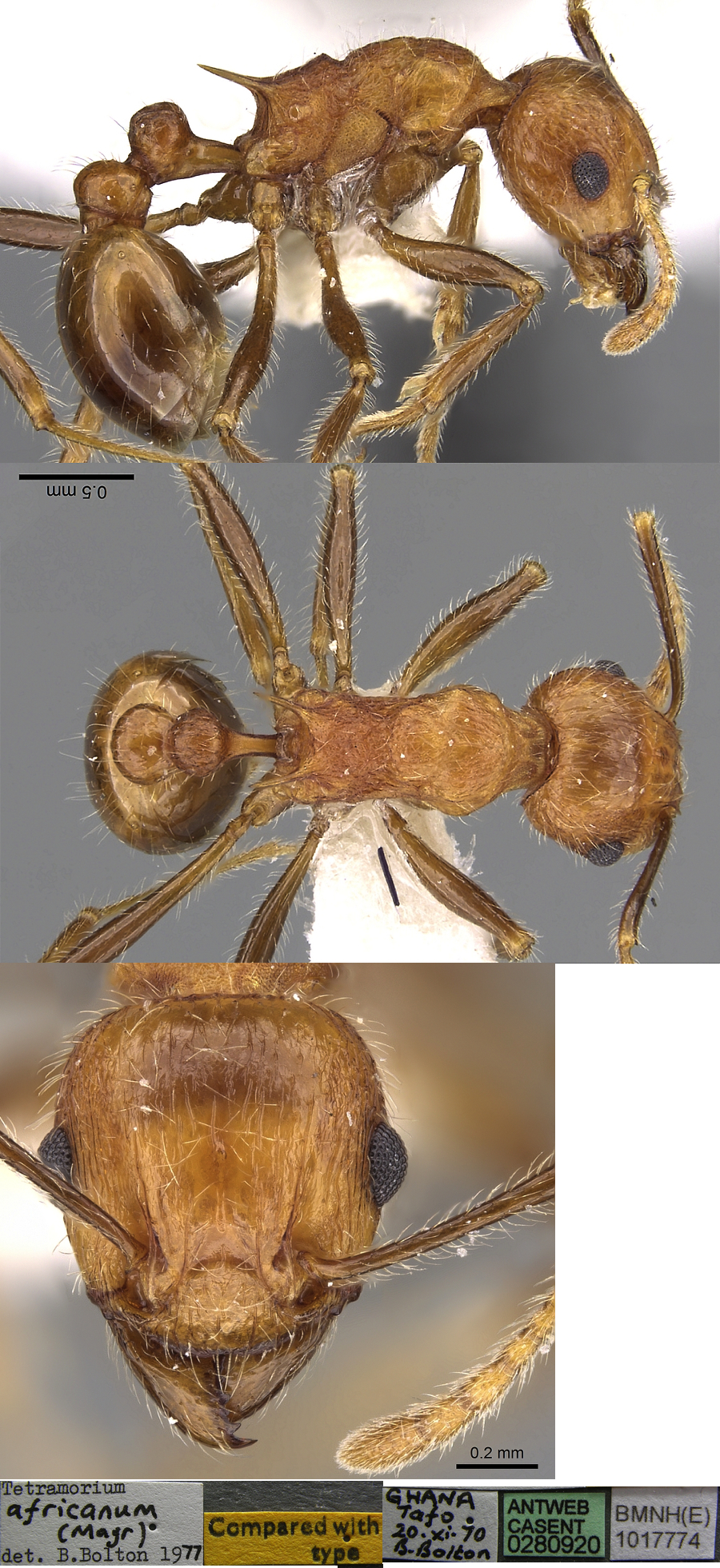 The photomontage of a
worker from Ghana (listed by Bolton, 1980: 355) is collated from http://www.antweb.org/specimen.do?name=casent0280920. The photomontage of a
worker from Ghana (listed by Bolton, 1980: 355) is collated from http://www.antweb.org/specimen.do?name=casent0280920.
|
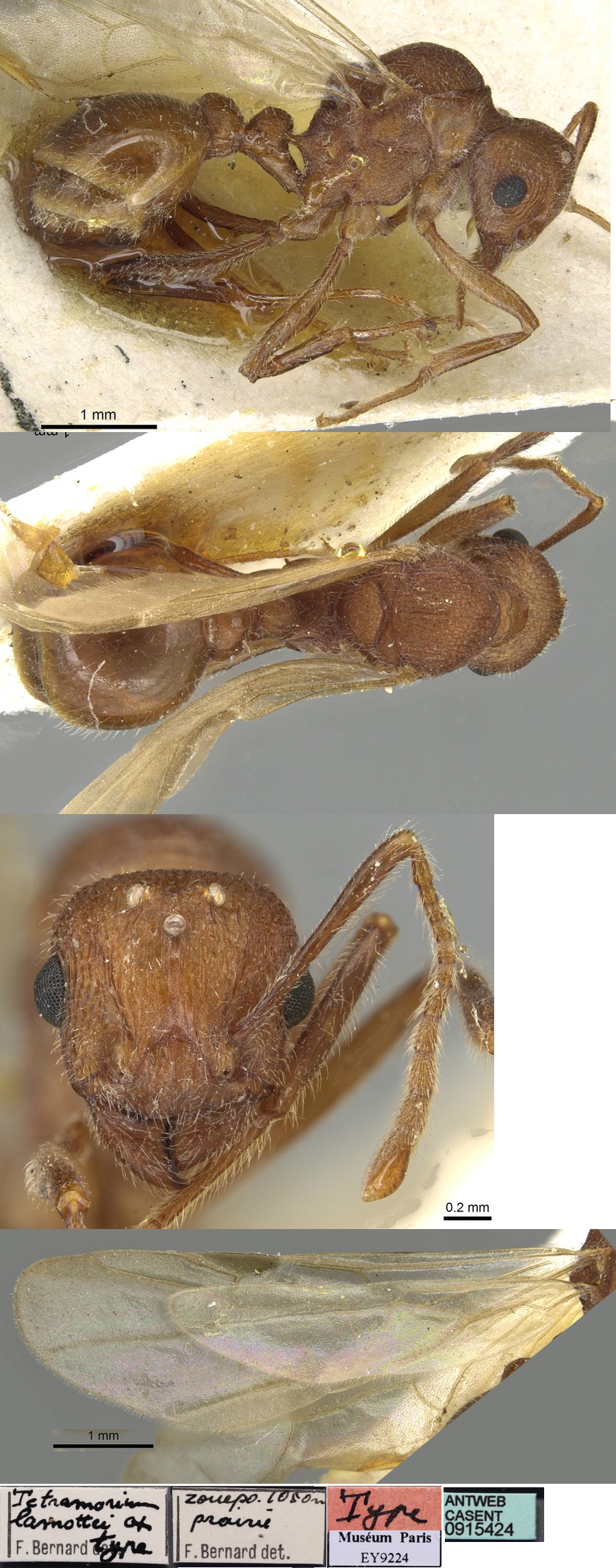 The photomontage of
the lamottei
type queen is collated from http://www.antweb.org/specimen.do?name=casent0915424. The photomontage of
the lamottei
type queen is collated from http://www.antweb.org/specimen.do?name=casent0915424.
|
|